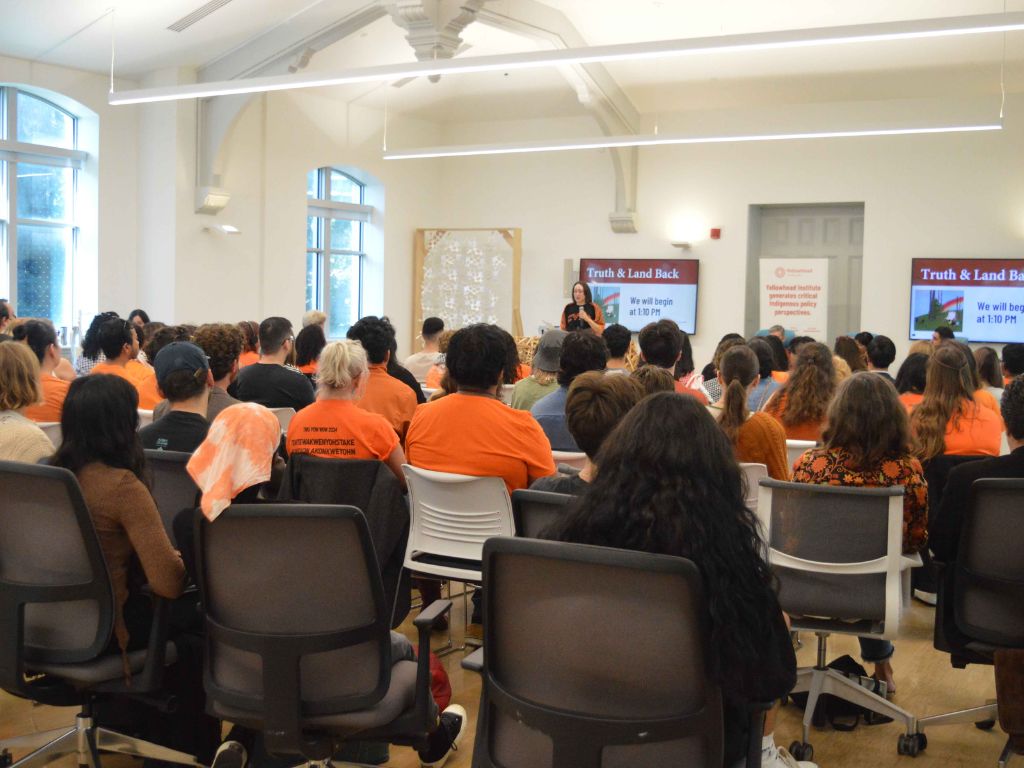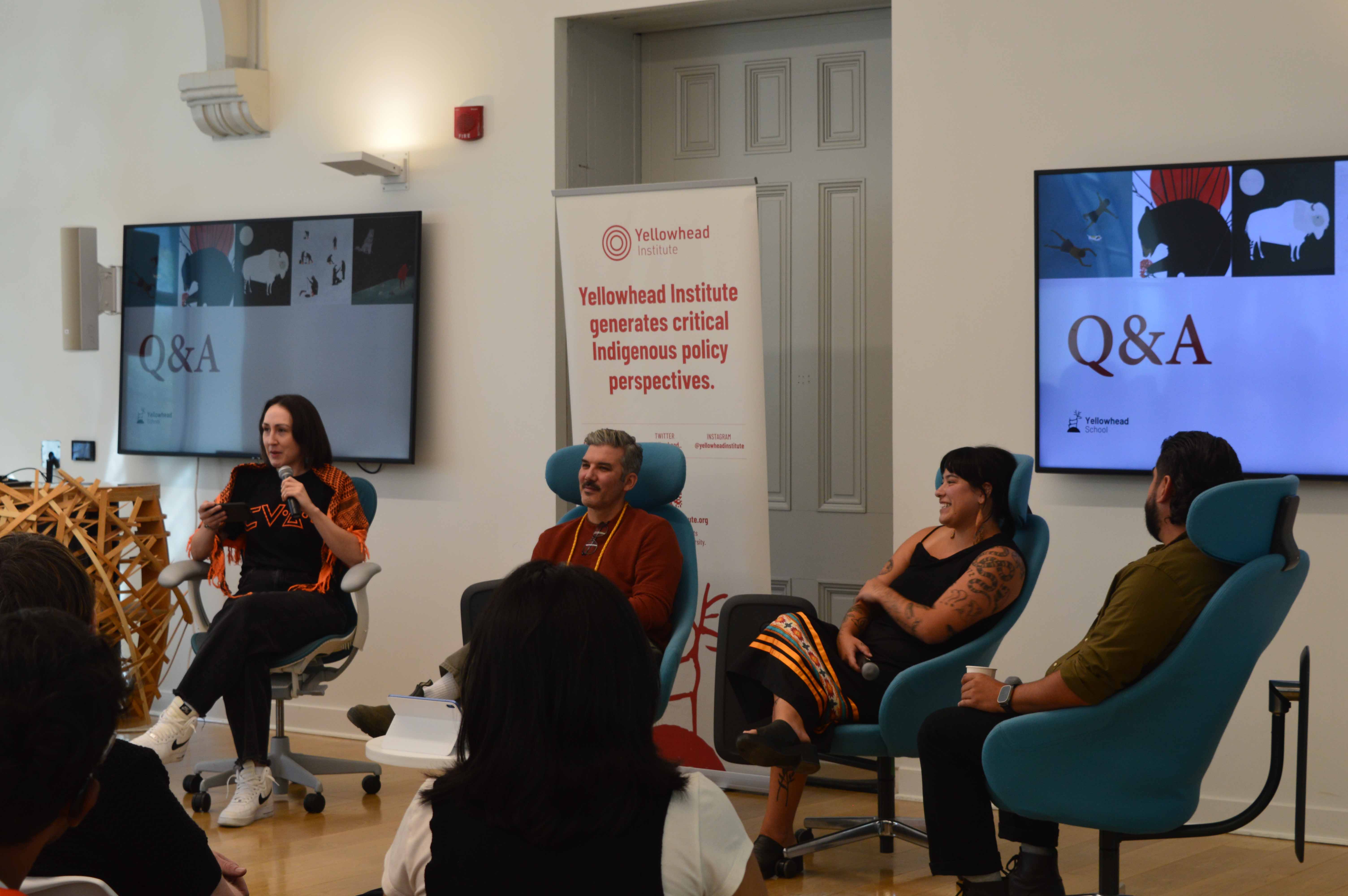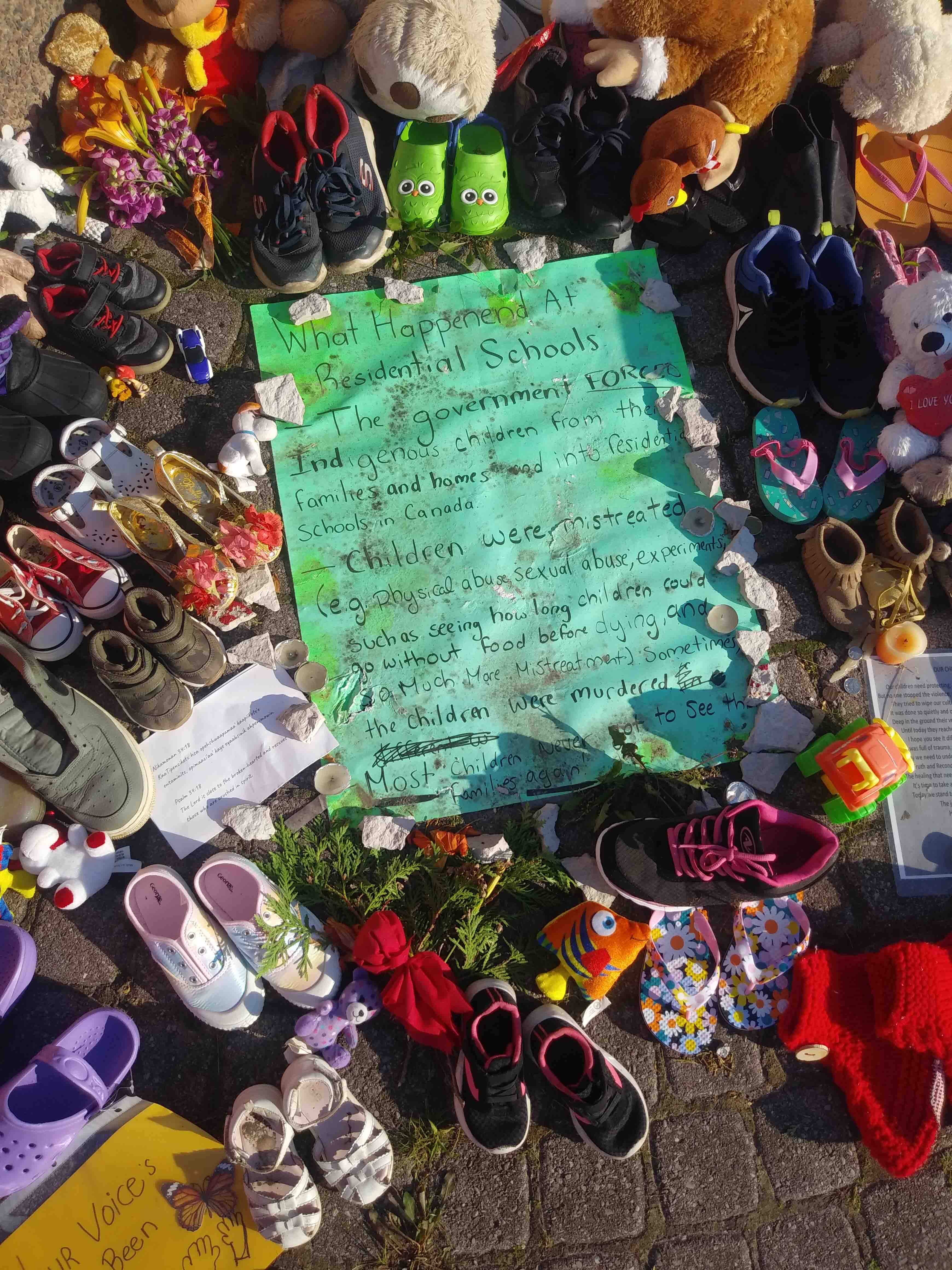Educational events mark National Day for Truth and Reconciliation 2024
National Day for Truth and Reconciliation was first observed federally on September 30, 2021, in an attempt to honour the children who did not return home and acknowledge the multi-generational impacts of the Canadian Indian Residential School system on survivors and their families. On National Day for Truth and Reconciliation 2024, two leaders in Indigenous scholarship and activism, housed in the Faculty of Arts, held events to educate and inform the public and Toronto Metropolitan University (TMU) communities about the Land Back movement and Residential School history.

Large turnout for the first Yellowhead Fire series event of the year.
Yellowhead School launches Land Back course on National Day for Truth and Reconciliation
Yellowhead School launched its inaugural new open-access, seven-module course educating on land dispossession and forms of Indigenous resistance. Yellowhead course collaborators held a panel discussion to address their new course, Land Back (external link) . Spanning from the origins of colonialism to the forms of activism and advocacy that arise out of solidarity, Land Back will advance understanding for Indigenous community members, high school or undergraduate students and anyone interested in learning more about the practice.

Panel discussion with Megan Scribe, Hayden King, Riley Yesno, and Shady Hafez.
The Yellowhead School (external link) presents Yellowhead Fire (external link) series, uniting scholars, activists and artists to address urgent issues, share ideas and provide crucial Indigenous perspectives on settler colonialism and the reclamation of Indigenous land. This year’s theme, “A Different Kind of Education,” focuses on Indigenous knowledge and education. Based on the Yellowhead Institute's Red Paper by the same name, Yellowhead Fire introduced Yellowhead Online's inaugural course, Land Back, on September 30, 2024.
Hosted by Megan Scribe, Yellowhead School Education Director, this event featured a panel discussion with course collaborators and Fellows Shady Hafez and Riley Yesno and was moderated by Yellowhead Institute Executive Director, Hayden King. It engaged the tensions in the Land Back movement.
The new Land Back course has generated significant interest, with over 200 registrations ahead of its official launch, coinciding with the event. This course consists of seven modules, each addressing a key component of the Yellowhead Red Paper Land Back (external link) report, published in 2019: Introduction to Land Back; the Spectrum of Consent; Denial; Recognition; Reclamation; Land Back and Climate Action; and Land Back Futures. The panel explored these topics in depth.

Following the panel discussion, a viewing of Yellowhead Institute’s first short film documentary, Return to Gale Creek (external link) , was shown. This documentary followed the enduring effects of the October 13, 2016 incident, when the Nathan E. Stewart tug and fuel barge spilled 110,000 litres of oil and fuel in the unceded waters of the Heiltsuk Nation on British Columbia's central coast. At the centre of the film, Russell, a first responder at the spill site, and Latoya, his daughter, share their memories of Gale Creek, recounting the day of the incident and its enduring effects on both their lives and the Heiltsuk community. This film is one of the several shared in the online course.
Yellowhead Online is now available. Learn more and register for the Land Back Online Course. (external link)
Pamela Palmater’s YouTube Live: Confronting Residential School Denialism discusses counter-narrative and misinformation on Canadian Residential Schools
The tapestry of Canadian identity has historically excluded Indigenous peoples, including forced assimilation through various means, including Indian residential schools and day schools. Where Indigenous life, language, belief systems, and culture are treated as a threat to Canadian national identity and settlement, the truth behind the Indian residential school system further threatens to rupture the self-identity of some Canadians. Pamela Palmater’s YouTube Live conversation, Confronting Residential School Denialism (external link) , addresses the common misconceptions that drive denialism and public division.
The conversation, which took place on September 30, 2024, interrogates the rise in denialism and anti-Indigenous sentiment and explores how the creation of counter-narratives and misinformation impedes healing for survivors and their families while fracturing Canadians’ notion of Truth and Reconciliation.
Advocating for Truth
Pamela Palmater (external link) is a Mi’kmaw lawyer, activist, scholar and member of the Eel River Bar First Nation in northern New Brunswick. Palmater has been a lawyer for 25 years and is a professor in the Department of Politics and Public Administration and Chair of Indigenous Governance at TMU. Palmater publishes articles on Indigenous human rights and social justice matters while engaging in public education through various academic and social channels, collaborating with Indigenous communities, First Nations and human rights organizations and produces multi-media work.
The live-streamed discussion between Palmater and Indigenous studies scholar and historian Sean Carleton (external link) from the University of Manitoba confronted Indian residential school denialism and its harmful repercussions on social progress around reconciliation. Palmater and Carleton discussed how counternarratives arise and why they gain traction. “Denialists are looking for ways to delegitimize the Truth and Reconciliation Commission and shake people’s confidence in truth so that they can close the avenue to healing and justice,” said Carleton (22:40-22:53). Palmater and Carleton utilized the analogies of an incomplete photograph or isolated chapter in a survivor’s memoir to exemplify how denialists form counternarratives that exclude proper context. The images depicting smiling children or testimonies from survivors dwelling on fond memories of learning how to play hockey or piano represent a small fraction of what occurred within a complex and destructive system. Carleton noted that these good memories often reflect the survival tactics children developed in residential schools.

An array of children’s shoes placed in memorial of the residential school children who never made it home.
Photo taken at Barrie’s waterfront, July 1, 2021.
Palmater emphasized how some politicians and government officials have contributed to public doubt by insisting the Indian residential school system was an ‘unintended’ failure of education policy originally created with ‘good intent.’ Regardless of intent, Carleton argues, individual actors were working within a system that was structurally designed to dismantle Indigenous communities and cultures.
Palmater and Carelton explored other crucial elements of inquiry—how denialists exploit gaps in the changing landscape of knowledge and where comparison with previous genocides may fail to account for the specific historical, cultural, and legal context of the genocide (external link) of Indigenous peoples, including through policies like Indian residential schools.
“Education not for awareness, education for action.”
At the forefront of combatting denialism, Palmater expressed a need to reinforce implementation and hold governments at all levels accountable for taking action.
Palmater has shared key resources to help individuals further educate and empower themselves to counter denialism: